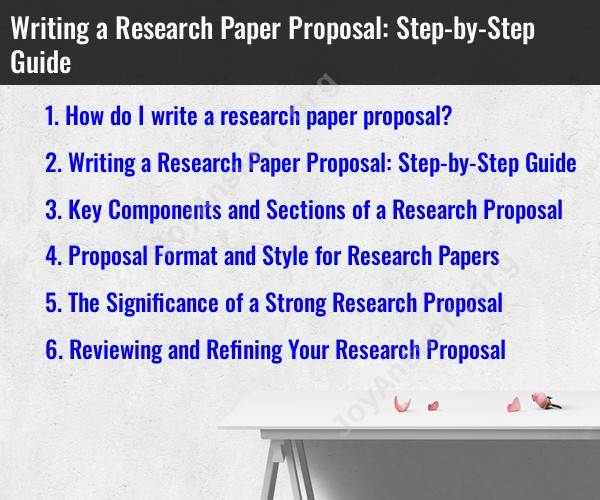How do I write a research paper proposal?
Writing a research paper proposal involves outlining your research idea, explaining its significance, and describing how you plan to conduct the research. Here's a step-by-step guide on how to write a research paper proposal:
Title:Start with a clear and concise title that reflects the main theme of your research. Your title should be descriptive and capture the essence of your study.
Introduction:Begin your proposal with an introduction that provides context for your research. Explain the background, the issue or problem you want to address, and why it's important. Clearly state the research question or hypothesis you aim to investigate.
Literature Review:Include a section that reviews relevant literature. Discuss previous research and findings related to your topic. This demonstrates your understanding of the existing body of knowledge and helps you justify the need for your research.
Research Objectives and Questions:Clearly state your research objectives or questions. What do you want to achieve with your research, and what specific questions do you intend to answer? Be precise and concise.
Methodology:Describe your research methodology in detail. Explain how you plan to collect and analyze data. Mention the research design, data sources, data collection methods, and any statistical or analytical techniques you intend to use. Justify your chosen methods and discuss their appropriateness.
Research Timeline:Create a timeline or schedule for your research, outlining the major milestones and deadlines. This helps reviewers understand the project's feasibility and your commitment to completing it in a timely manner.
Significance of the Study:Explain why your research is important. Discuss how it contributes to existing knowledge, addresses gaps in the literature, or has practical implications. Emphasize the relevance and potential impact of your work.
Expected Results:Provide a brief overview of the expected results or outcomes of your research. While you can't predict your findings with certainty, you can outline the hypotheses and potential contributions.
References:Include a list of references or citations for the sources you referenced in your proposal. Ensure you follow a citation style (e.g., APA, MLA) consistently.
Budget (if required):If your research proposal requires funding, include a budget section that outlines the anticipated expenses, such as materials, equipment, travel, or personnel costs.
Conclusion:Summarize the key points of your proposal, reiterate its significance, and state your commitment to carrying out the research.
Appendices (if necessary):Include any additional information, such as sample surveys, questionnaires, or data collection instruments, in the appendices.
Proofread and Edit:Carefully proofread your proposal for grammatical and typographical errors. Ensure clarity and coherence in your writing.
Peer Review:Before submitting your proposal, seek feedback from colleagues, mentors, or advisors. They can provide valuable insights and suggestions for improvement.
Formatting:Format your proposal according to the specific guidelines provided by the institution or funding agency to which you're submitting it. Pay attention to font, margin, and citation style requirements.
Once you've completed your research paper proposal, submit it to the appropriate review committee or funding agency, following their submission guidelines and deadlines. Be prepared to revise and refine your proposal based on feedback and suggestions from the reviewers.
Sure, here is a detailed explanation of the five topics you mentioned:
Writing a Research Paper Proposal: Step-by-Step Guide
Writing a research paper proposal is an essential step in the research process, as it helps you define your research question, methodology, and expected outcomes. Here's a step-by-step guide to crafting a compelling research proposal:
Identify a Research Question: Clearly define the central question or problem your research aims to address. Ensure it is focused, researchable, and has potential significance.
Conduct a Literature Review: Thoroughly review existing literature related to your research question. This will help you understand the current state of knowledge, identify gaps in research, and position your study within the broader context.
Develop a Research Methodology: Outline the methods you will employ to answer your research question. This may include data collection methods, analysis techniques, and ethical considerations.
Articulate Expected Outcomes: Clearly state the anticipated results or contributions your research aims to make to the field. This demonstrates the potential impact of your study.
Create a Timeline and Budget: Outline a realistic timeline for completing your research, including milestones and deadlines. Estimate the resources and funding needed to conduct your study effectively.
Write and Format the Proposal: Organize your proposal into clear sections, including Introduction, Literature Review, Research Methodology, Expected Outcomes, Timeline and Budget, and References. Follow the formatting guidelines specified by your institution or funding agency.
Key Components and Sections of a Research Proposal
A well-structured research proposal typically includes the following key components:
Title Page: Clearly states the research title, author(s), affiliation, and contact information.
Abstract: Provides a concise overview of the research question, methodology, and expected outcomes.
Introduction: Introduces the research topic, highlights its significance, and presents the research question in context.
Literature Review: Summarizes relevant literature, identifies gaps in research, and positions your study within the existing body of knowledge.
Research Methodology: Outlines the research design, data collection methods, analysis techniques, and ethical considerations.
Expected Outcomes: Clearly states the anticipated results or contributions your research aims to make to the field.
Timeline and Budget: Provides a realistic timeline for completing your research and estimates the resources and funding needed.
References: Includes a complete list of all sources cited in the proposal using the appropriate style guide.
Proposal Format and Style for Research Papers
The format and style of your research proposal should follow the guidelines specified by your institution or funding agency. Common style guides include APA, MLA, and Chicago. Ensure consistent formatting throughout the proposal, including font style, font size, margins, and line spacing.
The Significance of a Strong Research Proposal
A strong research proposal serves several critical purposes:
Demonstrates Research Readiness: A well-written proposal convinces reviewers of your ability to conduct rigorous research and contribute to the field of study.
Attracts Funding and Support: A compelling proposal can attract funding opportunities, grants, and scholarships to support your research endeavors.
Provides Direction and Focus: A clear proposal serves as a roadmap for your research, guiding your data collection, analysis, and interpretation.
Encourages Feedback and Refinement: The review process provides valuable feedback from experts, allowing you to refine your research approach and strengthen your proposal.
Reviewing and Refining Your Research Proposal
Seek feedback from peers, mentors, or research supervisors to identify areas for improvement. Carefully review your proposal for clarity, conciseness, and adherence to formatting guidelines. Ensure your proposal effectively communicates the significance of your research and demonstrates your ability to conduct a rigorous study.













